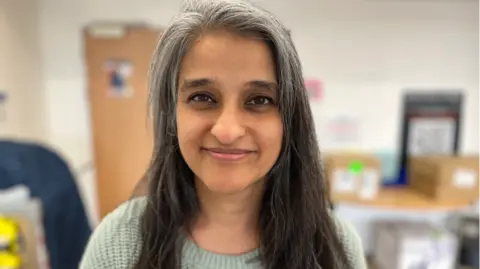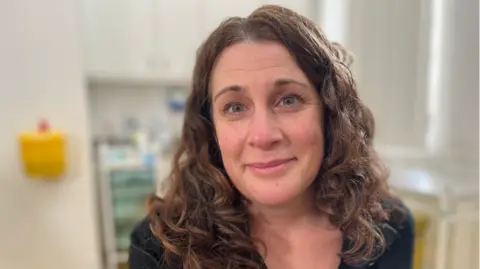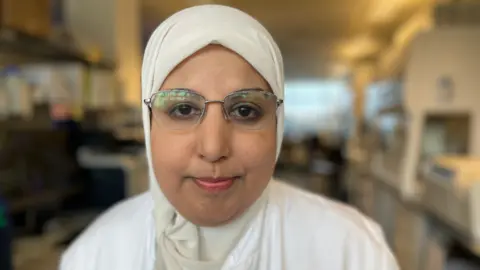The women behind life-saving Covid vaccine trials
"We were privileged and lucky enough that we could do something."
Three women who were involved in the development of the Oxford AstraZeneca Covid vaccine have told the BBC about the challenges they so vividly remember.
Parvinder Aley, Sagida Bibi and Hannah Robinson, from the Oxford Vaccine Group (OVG), spent up to 18 hours a day, seven days a week working on the clinical trials in 2020.
"Sometimes I couldn't go home for a week," said Dr Bibi, who was tasked with collecting blood samples from 12,000 participants while remaining a safe distance apart.
Ms Robinson, who moved into a camper van in the clinic car park during the trials, said: "It was literally all hands on deck, thinking 'just do what you have to do to get the vaccine licensed'."
Scientists at the University of Oxford had developed a vaccine prior to March 2020 but had to rapidly speed up the testing and production schedule from years of trials, to just months.

Dr Aley, who facilitates research on the development and implementation of vaccines, knew that the group had a serious task ahead when lockdown was announced.
She recalls being told: "This is not about glory, it's about delivering."
Measures like wearing masks and washing hands helped to slow the spread of the virus.
However, Dr Aley said: "To get us out of the situation we were going to need to get a vaccine.
"That responsibility felt huge but also we know how to do that."
OVG had the expertise needed to test the vaccine but faced a difficult task - carrying out a clinical trial with more than 12,000 participants while complying with strict social distancing measures.

Ms Robinson explained that the trial was mapped out in February 2020.
She said: "I was trying to work out how we could see a hundred people a day for a trial.
"It was very quickly clear that it would be huge. In a matter of weeks it had grown from hundreds to thousands."
Her role was demanding, so Ms Robinson made the decision to live out of a camper van on the premises.
"Eighteen hour days wouldn't be unusual," she said.
"It was seven days a week for sure."
Despite this, Ms Robinson fondly reflects on the atmosphere.
"It was a good mood. People were tired but positive," she said.
The team received many donations and gifts.
They had little free time to do everyday activities like food shopping so key workers brought them food.
So much food that a second fridge was purchased to store it all.

Dr Bibi worked in the lab during the trials, spinning blood samples from more than 12,000 participants.
She said: "Even though we say 12,000 participants, when were collecting blood and spinning it down, you have to times that by five or six for the amount of sample tubes that you end up collecting per visit.
"It's a huge number of samples you bank across all of these sites."
Dr Bibi lives in Birmingham which made it difficult for her to go home when working in Oxford.
"There were hard days when people were strained and upset or just tired and missing family."
During the trials, she spent more time away from her family than ever before.
The work done by these women and their wider team has not gone unnoticed.
Although it is no longer produced or licensed, more than three billion doses of the vaccine they trialled have been administered across the world.
It was linked with a rare side effect that caused a type of blood clot that in November 2022 was associated to 81 deaths.
All vaccines carry the risk of side effects and the chances of severe complication from Covid itself were higher.
The University of Oxford says the vaccine saved 6.3m lives in the first year of the global vaccine rollout – the most out of all the vaccines in circulation at the time.
And Dr Aley said: "The feeling of teamwork, the feeling of achievement, the feeling of impact was amazing, I don't actually know how to describe it."
She received an OBE for her services to vaccination during the pandemic.
"I've got twin daughters and I probably slept more the year that they were born than that year", she said, adding that she felt proud that she could be a role model for her children.
"Not bad for a working class girl from an immigrant family from Wolverhampton."
You can follow BBC Oxfordshire on Facebook, X (Twitter), or Instagram.
